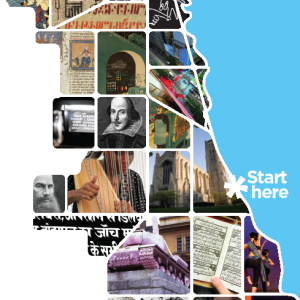"I am a Jew. Hath not a Jew eyes … If you prick us do we not bleed?"
—The Merchant of Venice, Act III, Scene 1
"I am asham'd that women are so simple
To offer war where they should kneel for peace;
Or seek for rule, supremacy, and sway
When they are bound to serve, love, and obey."
—The Taming of the Shrew, Act V, Scene 2
The Merchant of Venice and The Taming of the Shrew are two of Shakespeare’s most often performed comedies. Yet the subject matter often disturbs modern audiences, who may hesitate to view the plays as “comedies.” Who does not wince as Kate is verbally and sometimes physically slapped around the stage or the Jewish Shylock is stripped of his property and everything he values?
Richard Strier, the Frank L. Sulzberger Distinguished Service Professor in English, will address these issues in his Humanities Day keynote address, “Shakespeare’s Prejudices: Shrews and Jews,” on October 20, 2012.
“Certain scholars make the case that in Shakespeare’s time, [most people] didn’t know any Jews and didn’t have our sensitivity towards feminist issues,” says Strier, who emphasizes that “it’s important to give historical perspective without a whitewash.”
Strier's scholarship brings together two modes of literary study that are often seen as antagonistic: formalism and historicism. He is interested in the intellectual history of the early modern period, especially theological and political ideas, but also how the ideas themselves find their way into English and American literature in the period.
Strier teaches courses on topics from women poets of the seventeenth century to society and politics in Shakespeare's plays to the religious lyric in England and America. His most recent book, The Unrepentant Renaissance: From Petrarch to Shakespeare to Milton, won the 2011 Robert Penn Warren-Cleanth Brooks Award for Literary Criticism.
Strier says he does not want “to dismiss concerns with misogyny and anti-Semitism as historically inappropriate—anachronistic, as the term goes—but to see what difference to our judgments some historical contextualizing and close reading can make.” His talk will be “a balance between history and our current admirable and political concerns.”
 SUGGESTED READINGS
SUGGESTED READINGS
In addition to reading the two plays under discussion, The Merchant of Venice and The Taming of the Shrew, Strier (pictured left) suggests The Jew of Malta by Christopher Marlowe and an anonymous ballad entitled, “A Merry Jest of a Shrewd and Curst Wife Lapped in Morel's Skin for her Good Behavior.”
“Marlowe was the dominant dramatist of the time, and the Jew is the central character in this play, so there is no doubt that he was thinking about it and knew it well,” says Strier, referring to Shakespeare and The Merchant of Venice.
The ballad, says Strier, is a bit more obscure for modern day readers but was a popular mid-sixteenth century tale about how to treat a shrewish wife. While Shakespeare may or may not have been familiar with it, “it’s a good example of Elizabethan humor.”
Strier also recommends Il Pecorone, the source text for The Merchant of Venice, which is included in many editions of the play. The Marlowe text is widely available online, and the ballad can be found in Frances Dolan’s Bedford edition of The Taming of the Shrew.
“People who want to prepare in advance should,” says Strier. “It’s always useful to do and is interesting, especially in relation to The Merchant of Venice.”



Add new comment